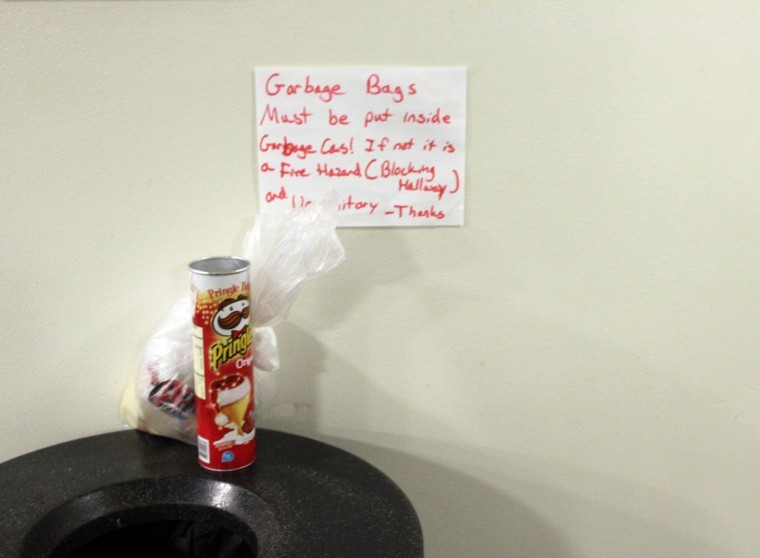Residence hall fines aim to correct student behavior
A garbage bag sits atop a trash can in Stevenson Towers. Improperly disposing of garbage is one of many common floor fines.
February 27, 2012
Brianna Henson said she does not think charging students for messes and damages other students create is fair.
The freshman physical therapy major said she was once charged for damages made in the boy’s bathroom in her dorm. People clogged up a urinal and caused water damage, she said.
“I don’t go in the boy’s bathroom, I’m a girl obviously,” she said. “So why should everyone get charged?”
The residence halls at NIU charge students for damages and excessive cleaning when they cannot find anyone responsible, according to the 2011-2012 Guidepost. Students are charged to cover up additional costs of cleaning beyond the usual cleaning provided by the residence halls, said David LaBanc, director of facilities and operations for housing and dining, in an email.
Incidents are tracked and categorized as either damages or excessive cleaning. Last semester there were 12 different incidents in the residence halls requiring excessive cleaning, LaBanc said. The residence halls collected $3,700 in charges to cover the costs of excess cleaning last semester, LaBanc said.
LaBanc said he works with hall directors, community advisors, building services and occasionally the police to find out who is responsible for damages or excessive messes. Flyers are posted in dorm floors notifying residents they will be charged for messes until the people responsible are found. The people responsible are found about 50 percent of the time, LaBanc said.
LaBanc said overall, the policy effectively corrects the behavior of dorm residents. Staff members occasionally help residents understand communal living, maintaining a clean environment and holding other residents accountable.
Henson said she does not think the policy deters students from causing damages and excessive messes.
“If somebody doesn’t care, then they are not going to care about anybody else,” she said.
Henson said she doesn’t find the charges for excess messes or damages expensive.
Christian Greer, sophomore computer electrical engineering major, said while he doesn’t know how else to cover the costs of cleaning up excess messes, it is still not fair to charge students who are not responsible.
“You have to chalk it up to a loss; you can’t charge everyone,” Greer said.



